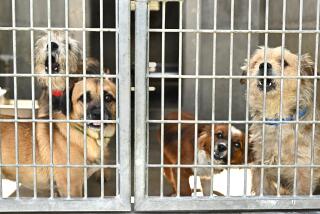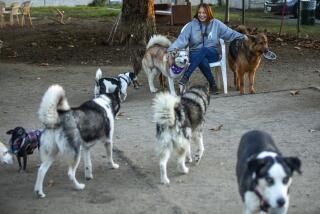The Obamas’ second first dog is a chance to talk about all dogs
Despite President Obama’s mention during his 2012 victory speech that “one dog’s probably enough,” apparently it wasn’t. The Obamas have expanded the first family with another Portuguese water dog, which they named Sunny. All we know about Sunny is that she hails from Michigan, is 14 months old and appears to be as impossibly cute as Bo, the dog that she is intended to be a playmate for, frolicking on the White House lawn.
We don’t know if the Obamas got Sunny from a breeder, but Bo came from a breeder, a respected one. Most people in the animal welfare community had hoped that the Obamas would adopt a dog from a rescue organization or a shelter, and the president said in 2008 after he was elected that his preference was to get a shelter dog. I understand that the Obamas have some constraints on their dog selection, foremost being that their daughter Malia has allergies, so their pet needed to be a hypoallergenic breed.
Still, whether Sunny came from a breeder or not, the Obamas made some admirable moves with their second first dog. They chose a dog over a year old, a reminder that there are plenty of wonderful dogs out there for adoption that are not little puppies. And in honor of Sunny’s arrival at the White House, the Obamas made a donation, in an undisclosed amount, to the Washington Humane Society.
Wouldn’t it be great if everyone who got a dog from a breeder also made a contribution to a local rescue group or shelter? Across the country, rescuers and shelters work hard to care for thousands of homeless animals and adopt them out. Increasingly, I run across people who have adopted a dog or cat from a shelter or rescue group and found a remarkable pet.
But there is a place for responsible breeding. Wayne Pacelle, chief executive of the Humane Society of the U.S., has said as much and only cautions people to avoid backyard breeders (who may be overbreeding their dogs or keeping them in bad housing) and pet stores, the overwhelming majority of which get their dogs from puppy mills. The only exception is a pet store that follows a humane model and only gets its animals from shelters or rescue groups. (There are a few in Los Angeles.)
Puppy mills -- large-scale commercial breeders -- are technically not illegal (unfortunately) but are governed by minimal standards of health and safety and often don’t meet those, although they are subject to federal inspection. Nonetheless, they are usually little more than factory farms where dogs are bred too often and kept under horrible, often filthy conditions. Puppy mill dogs sold on the Internet are subject to no regulation at all. But the U.S. Department of Agriculture is working to change that. The department wants to implement a new rule that will require large-scale breeders selling over the Internet or by mail or phone to be licensed and inspected under, at least, the existing federal standards.
The White House -- now the home of what seem to be two responsibly bred dogs -- should make that rule final.
ALSO:
College: It’s not just ‘Made in the U.S.A.’
Another shark attack in Hawaii -- revenge for sharkfin soup?
More to Read
A cure for the common opinion
Get thought-provoking perspectives with our weekly newsletter.
You may occasionally receive promotional content from the Los Angeles Times.







